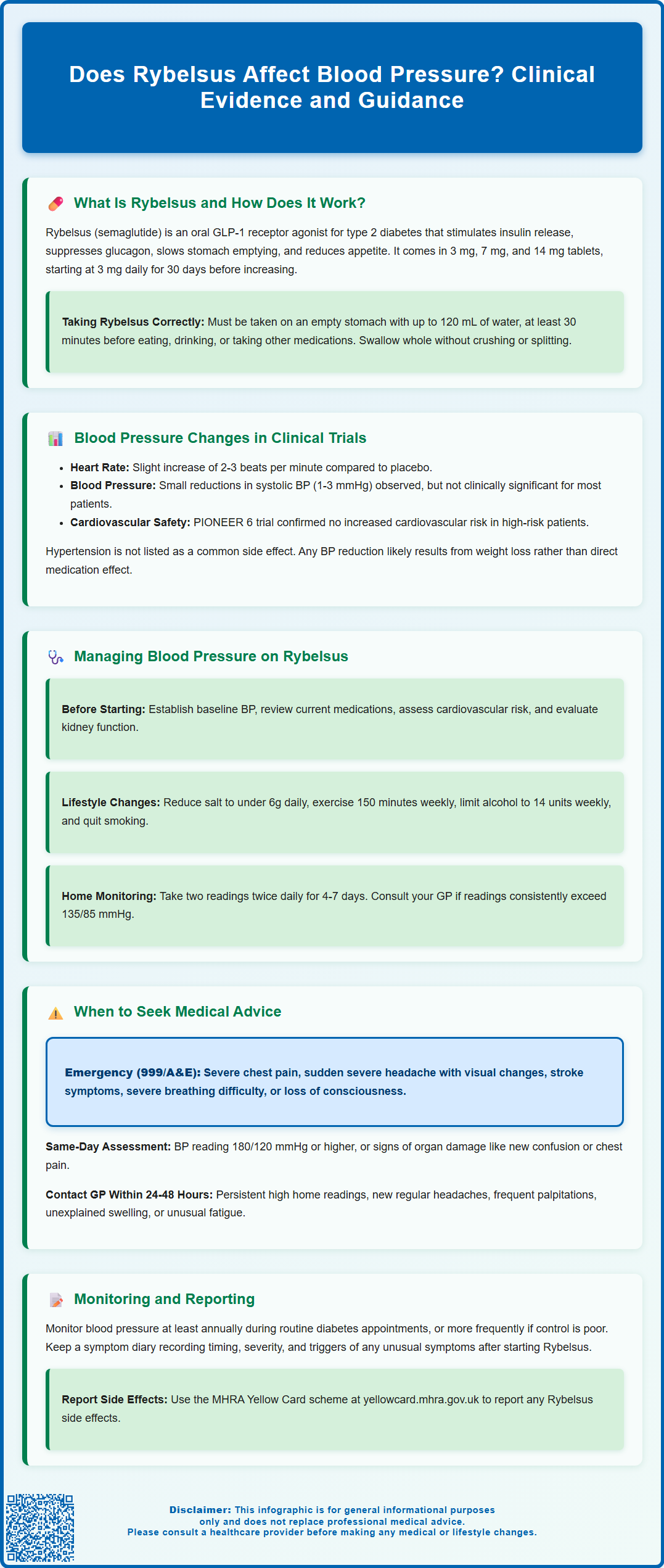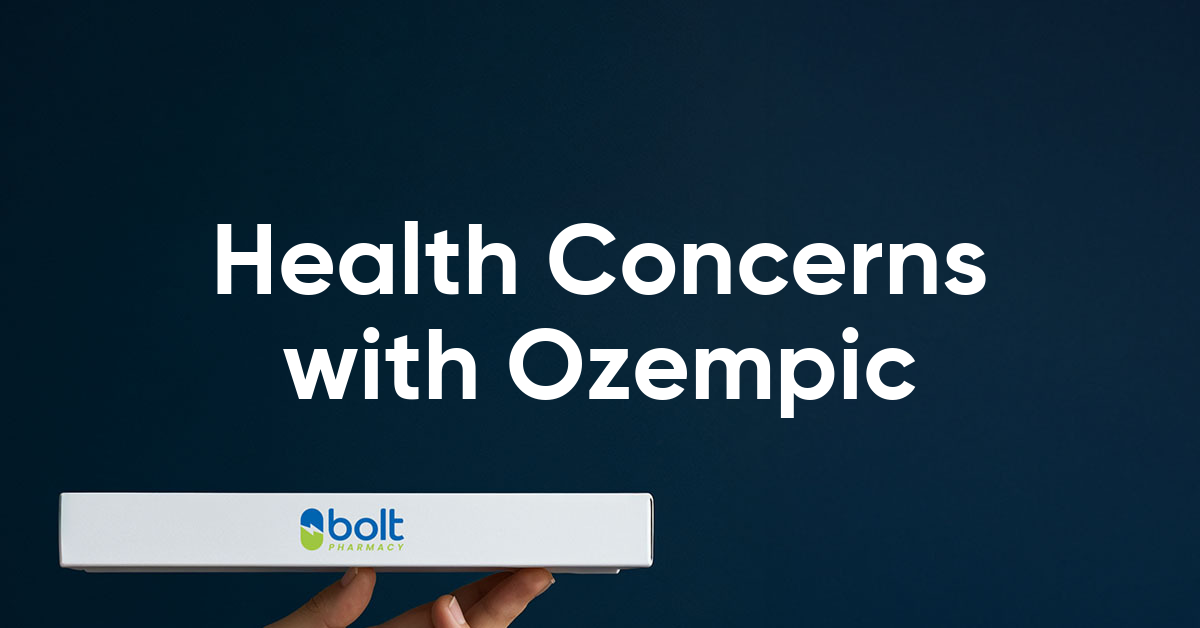Many patients prescribed Rybelsus (semaglutide) for type 2 diabetes wonder whether this medication affects blood pressure. Rybelsus is a glucagon-like peptide-1 (GLP-1) receptor agonist that helps regulate blood glucose levels through multiple mechanisms. Clinical trials have shown that Rybelsus generally has minimal impact on blood pressure, with some studies reporting small reductions in systolic blood pressure. Understanding how this medication interacts with cardiovascular parameters is important for patients managing both diabetes and hypertension. This article examines the evidence on blood pressure changes with Rybelsus and provides guidance on monitoring and management.
Summary: Rybelsus (semaglutide) typically has minimal effect on blood pressure, with clinical trials showing small reductions in systolic blood pressure and modest increases in heart rate that are generally not clinically significant.
- Rybelsus is a GLP-1 receptor agonist licensed for type 2 diabetes treatment, working by stimulating insulin secretion, suppressing glucagon, and slowing gastric emptying.
- Clinical trials reported small systolic blood pressure reductions of 1-3 mmHg and heart rate increases of 2-3 beats per minute compared to placebo.
- The PIONEER 6 trial demonstrated cardiovascular safety, showing non-inferiority for major adverse cardiovascular events in high-risk patients.
- Regular blood pressure monitoring is recommended at diabetes review appointments, with home monitoring advised if readings consistently exceed 135/85 mmHg.
- Patients should seek urgent medical attention for severe chest pain, blood pressure readings of 180/120 mmHg or higher, or symptoms suggesting stroke.
Table of Contents
What Is Rybelsus and How Does It Work?
Rybelsus (semaglutide) is an oral medication licensed in the UK for the treatment of type 2 diabetes mellitus in adults. It belongs to a class of medicines called glucagon-like peptide-1 (GLP-1) receptor agonists, which work by mimicking the action of a naturally occurring hormone that helps regulate blood glucose levels.
The mechanism of action of Rybelsus involves several key processes:
-
Stimulating insulin secretion from pancreatic beta cells in a glucose-dependent manner, meaning it only works when blood sugar levels are elevated
-
Suppressing glucagon release, which reduces glucose production by the liver
-
Slowing gastric emptying, which helps moderate the rise in blood glucose after meals
-
Reducing appetite through effects on brain centres that control hunger and satiety
Rybelsus is typically prescribed when diet and exercise alone, or in combination with other diabetes medications such as metformin, have not achieved adequate glycaemic control. It is available in three tablet strengths (3 mg, 7 mg, and 14 mg) with a recommended starting dose of 3 mg once daily for 30 days, followed by 7 mg once daily. The dose may be increased to 14 mg once daily if needed for additional glycaemic control.
Rybelsus must be taken correctly for optimal absorption: on an empty stomach with up to 120 mL of water, at least 30 minutes before the first food, drink, or other oral medications of the day. The tablet should be swallowed whole and not split, crushed or chewed.
In clinical trials, Rybelsus has demonstrated significant benefits in reducing HbA1c levels (a measure of long-term blood glucose control). While weight loss is often observed with Rybelsus, it is important to note that the medication is not licensed for weight management. The effects on weight may be beneficial for patients with type 2 diabetes who are overweight, as weight reduction can improve overall metabolic health and cardiovascular risk factors.

Blood Pressure Changes Reported in Clinical Trials
Clinical trial data for Rybelsus have provided important insights into its effects on blood pressure. In the PIONEER clinical trial programme, which evaluated oral semaglutide in patients with type 2 diabetes, researchers observed modest but consistent changes in cardiovascular parameters, including blood pressure measurements.
Key findings from clinical trials include:
-
Slight increases in heart rate were noted, with mean increases of approximately 2-3 beats per minute compared to placebo
-
Small reductions in systolic blood pressure (the upper number) were observed in some studies, typically in the range of 1-3 mmHg
-
These blood pressure changes were generally not considered clinically significant for most patients
-
The effects appeared to be more pronounced at higher doses, though individual responses may vary
It is important to note that according to the MHRA-approved Summary of Product Characteristics (SmPC), hypertension (high blood pressure) is not listed as a common adverse effect of semaglutide. The modest increase in heart rate has been consistently documented and is thought to be a class effect of GLP-1 receptor agonists.
The cardiovascular safety of Rybelsus has been evaluated extensively, with the PIONEER 6 trial specifically designed to assess cardiovascular outcomes. This study demonstrated that oral semaglutide did not increase cardiovascular risk compared to placebo in patients with type 2 diabetes at high cardiovascular risk. The trial showed non-inferiority for major adverse cardiovascular events, providing reassurance about the medication's cardiovascular safety profile.
For patients with pre-existing hypertension, the modest blood pressure reduction seen with Rybelsus may be partly mediated through weight loss and mild natriuretic effects. However, these effects are generally small and should not be relied upon as a primary means of blood pressure control.
Managing Blood Pressure While Taking Rybelsus
For patients prescribed Rybelsus, particularly those with existing cardiovascular conditions or hypertension, appropriate monitoring and management strategies are essential to ensure optimal treatment outcomes and patient safety.
Baseline assessment before starting Rybelsus should include:
-
Blood pressure measurement to establish a baseline reading
-
Review of current antihypertensive medications and their dosing
-
Assessment of cardiovascular risk factors, including smoking status, cholesterol levels, and family history
-
Evaluation of renal function, as kidney disease can affect both blood pressure and diabetes management
Once treatment is initiated, regular monitoring is recommended according to NICE guidance for type 2 diabetes management. Patients should have their blood pressure checked at routine diabetes review appointments, at least annually or more frequently if blood pressure control is suboptimal or clinical need indicates.
Lifestyle modifications remain fundamental to managing both diabetes and blood pressure:
-
Dietary changes, including reducing salt intake to less than 6g per day and following a balanced diet rich in fruits, vegetables, and whole grains
-
Regular physical activity, aiming for at least 150 minutes of moderate-intensity exercise per week
-
Weight management, which may be supported by the appetite-suppressing effects of Rybelsus
-
Limiting alcohol consumption to no more than 14 units per week, spread over at least 3 days
-
Smoking cessation, which significantly reduces cardiovascular risk
For patients already taking antihypertensive medications, any dose adjustments should only be made under medical supervision. The weight loss sometimes achieved with Rybelsus may improve blood pressure control, potentially allowing for reduction in antihypertensive medication doses. Conversely, if blood pressure increases, intensification of antihypertensive therapy may be required.
Home blood pressure monitoring can be valuable for patients on Rybelsus. The NHS recommends taking two consecutive readings, one minute apart, twice daily (morning and evening) for 4-7 days. Discard the readings from day 1 and calculate the average of the remaining readings. A home blood pressure reading consistently above 135/85 mmHg (equivalent to a clinic reading of 140/90 mmHg) should prompt discussion with a healthcare professional.
Patients should be aware that Rybelsus can cause gastrointestinal side effects that may lead to dehydration and volume depletion, potentially affecting blood pressure. Adequate hydration is important, especially for patients taking diuretics or medications affecting the renin-angiotensin system.
When to Seek Medical Advice About Blood Pressure
Whilst Rybelsus is generally well-tolerated, patients should be aware of specific circumstances that warrant prompt medical attention regarding blood pressure changes or cardiovascular symptoms.
Seek urgent medical advice (contact 999 or attend A&E) if you experience:
-
Severe chest pain or pressure, particularly if radiating to the arm, jaw, or back
-
Sudden severe headache with visual disturbances, confusion, or difficulty speaking
-
Symptoms of stroke, including facial drooping, arm weakness, or speech difficulties
-
Severe shortness of breath or difficulty breathing at rest
-
Loss of consciousness or severe dizziness with falls
Seek same-day medical assessment if:
-
Your blood pressure reading is 180/120 mmHg or higher
-
You have signs of possible target organ damage (new confusion, chest pain, significant shortness of breath)
Contact your GP or diabetes specialist nurse within 24-48 hours if you notice:
-
Persistent elevated home blood pressure readings (consistently above 135/85 mmHg)
-
New or worsening symptoms such as regular headaches or visual changes
-
Palpitations or irregular heartbeat that is frequent or concerning
-
Unexplained swelling of the ankles, legs, or abdomen
-
Unusual fatigue or weakness that interferes with daily activities
Routine review is appropriate for:
-
Gradual changes in blood pressure that remain within acceptable ranges
-
Questions about medication interactions or side effects
-
Planned adjustments to diabetes or blood pressure medications
-
General concerns about cardiovascular health
Patients should maintain a symptom diary if they experience any unusual symptoms after starting Rybelsus, noting the timing, severity, and any associated factors. This information is valuable for healthcare professionals in determining whether symptoms are related to the medication or other causes.
It is important to attend all scheduled diabetes review appointments, where blood pressure monitoring is a standard component of care. These reviews allow for comprehensive assessment of diabetes control, medication effectiveness, and cardiovascular risk factors. If you have concerns between appointments, do not hesitate to contact your diabetes care team—early intervention can prevent complications.
If you suspect you are experiencing side effects from Rybelsus, you can report these through the MHRA Yellow Card scheme (yellowcard.mhra.gov.uk), which helps monitor the safety of medicines.
Frequently Asked Questions
Can Rybelsus cause high blood pressure?
No, Rybelsus does not typically cause high blood pressure. Clinical trials have shown small reductions in systolic blood pressure rather than increases, and hypertension is not listed as a common adverse effect in the MHRA-approved product information.
Should I monitor my blood pressure whilst taking Rybelsus?
Yes, regular blood pressure monitoring is recommended as part of routine diabetes care, at least annually or more frequently if you have existing hypertension. Home monitoring can be valuable if readings are elevated or borderline.
Does Rybelsus increase heart rate?
Yes, Rybelsus can cause modest increases in heart rate, typically 2-3 beats per minute compared to placebo. This is a recognised class effect of GLP-1 receptor agonists and is generally not clinically significant for most patients.
The health-related content published on this site is based on credible scientific sources and is periodically reviewed to ensure accuracy and relevance. Although we aim to reflect the most current medical knowledge, the material is meant for general education and awareness only.
The information on this site is not a substitute for professional medical advice. For any health concerns, please speak with a qualified medical professional. By using this information, you acknowledge responsibility for any decisions made and understand we are not liable for any consequences that may result.
Heading 1
Heading 2
Heading 3
Heading 4
Heading 5
Heading 6
Lorem ipsum dolor sit amet, consectetur adipiscing elit, sed do eiusmod tempor incididunt ut labore et dolore magna aliqua. Ut enim ad minim veniam, quis nostrud exercitation ullamco laboris nisi ut aliquip ex ea commodo consequat. Duis aute irure dolor in reprehenderit in voluptate velit esse cillum dolore eu fugiat nulla pariatur.
Block quote
Ordered list
- Item 1
- Item 2
- Item 3
Unordered list
- Item A
- Item B
- Item C
Bold text
Emphasis
Superscript
Subscript












